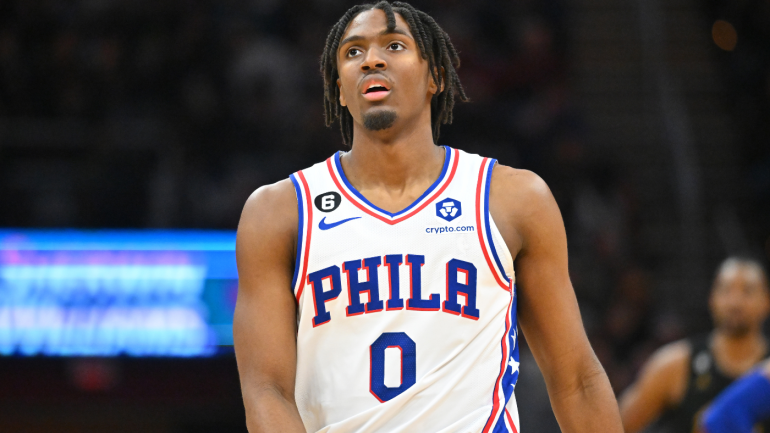
The Philadelphia 76ers are in a somewhat transitional state at the moment. James Harden opted into the final year of his contract reportedly with the understanding that the 76ers would try to trade him, ideally to the Los Angeles Clippers. The thought of Daryl Morey ever trading Harden was, at one time, unthinkable. Part of what might make it palatable today is the presence of Tyrese Maxey.
Maxey is coming off of a breakout third season. He averaged 20.3 points per game despite sharing Philadelphia's back court with Harden. He's one of the most explosive young guards in the NBA, and he's grown into a stellar 3-point shooter over the past several years as well. He has defensive limitations due to his size and he's not a great playmaker yet, but Maxey is on a trajectory towards becoming either a max-salary player or something very, very close.
The 76ers recognize this. They reportedly want to keep Maxey for the long haul. However, according to Kyle Neubeck of Philly Voice, they do not plan to extend him this offseason.
The idea here is to maintain maximum flexibility. By not extending Maxey, the 76ers obviously make him easier to trade, but they also set themselves up to be a major player in 2024 free agency if they want to. As of right now, the only Philadelphia player with a guaranteed salary for the 2024-25 season is Joel Embiid. P.J. Tucker has a player option. Everyone else they currently have could potentially come off of the books, and they will likely therefore prioritize expiring deals in a Harden trade for that exact reason.
That would give the Sixers max cap space and the right to retain to Maxey long-term. How? Maxey's cap hold as a restricted free agent next summer would be based on his draft slot. He was the No. 21 overall pick, so that figure would be relatively low: around $13 million. In other words, Philadelphia could go into next offseason with nothing on its books but Embiid's projected $51.5 million salary, Tucker's $11.5 million player option and a $13 million cap hold for Maxey. The 76ers would of course ultimately pay Maxey far more than that. However, by signing him last, they'd be able to treat his cap figure as $13 million while they pursue other players. It would effectively create artificial cap space, and with only those three players on the books.
The 2024 free agent class could be quite good. Pascal Siakam could be available if he does not extend with the Raptors. The same is true of Jaylen Brown and the Celtics, though a deal is widely expected there. How does Dejounte Murray sound? The CBA more or less makes it impossible for the Hawks to extend him at his fair market value. Veteran extensions can only grant a 40% raise in the first year of a new deal, but Murray is so underpaid at just $17.7 million that he has no reason to accept such an extension. He is therefore essentially a lock to become a free agent, and could be a great long-term backcourt partner for Maxey as a bigger guard who plays great defense. Whether it's one of those players or someone else, the 76ers would probably like to maintain the flexibility to pursue a big name next summer. In pure, basketball terms, this is the right approach.
There's one major problem here: the human element. Maxey has earned only rookie-scale money in his career. He has earned significantly more than that and he is eligible to get it right now. Sure, the Sixers can tell him that they'll pay him next offseason, but that puts all of the risk on his shoulders. What happens if he tears his ACL? Or simply has a down year? Or gets traded to a team that doesn't make sense for him? Some players are comfortable taking these kinds of risks for the sake of helping their teams come closer to championship contention. Others aren't.
Here's one notable example of the decision backfiring. In 2014, Kawhi Leonard won Finals MVP in his third NBA season. He was eligible for a max contract extension immediately afterward. The Spurs, however, planned to pursue LaMarcus Aldridge in 2015 and needed to maintain as much cap space as possible. They made Leonard wait, and they ultimately signed Aldridge. Three years later, Leonard was a Raptor. This wasn't the only point of friction in their relationship, but it certainly didn't help matters.
Adding to the complications here? Maxey is represented by Rich Paul of Klutch Sports. Paul is one of the most powerful agents in basketball, and explicitly not someone teams want to defy. Paul also happens to represent Murray, which could complicate a possible Philadelphia pursuit. Paul used to represent another prominent 76er: Ben Simmons. How much bad blood remains over his controversial trade request? Maxey was the only Klutch player on Philadelphia's roster last season.
This is a high-risk, high-reward approach to the offseason for Philadelphia. It probably represents the team's best chance at reorienting the roster in the wake of Harden's inevitable departure. The 76ers simply don't have many other options for remaining in championship contention. Most of their draft picks have already been traded. Maxey is their only promising young player. They likely need another impact addition or two to re-enter the title conversation without Harden. This is their cleanest path to getting one.
But in the process, they'd risk alienating the second-best player they have left. Sometimes this approach works. Sometimes it blows up in the faces of well-meaning executives. Only time will tell if that happens to Philadelphia, or if they ultimately manage to come to a more satisfying short-term resolution.


















